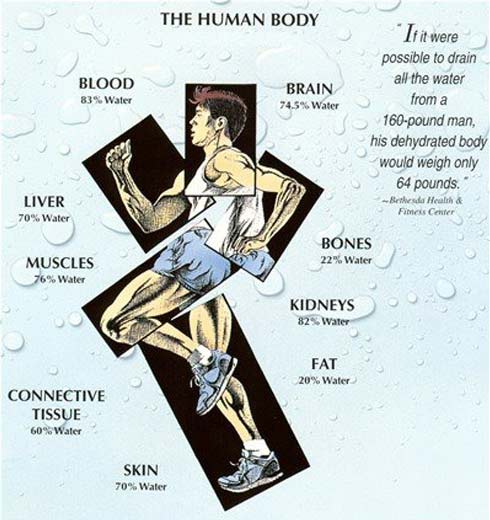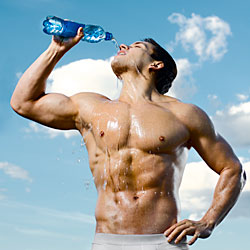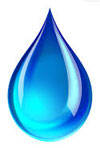- Like
- SHARE
- Digg
- Del
- Tumblr
- VKontakte
- Flattr
- Buffer
- Love This
- Save
- Odnoklassniki
- Meneame
- Blogger
- Amazon
- Yahoo Mail
- Gmail
- AOL
- Newsvine
- HackerNews
- Evernote
- MySpace
- Mail.ru
- Viadeo
- Line
- Comments
- Yummly
- SMS
- Viber
- Telegram
- JOIN
- Skype
- Facebook Messenger
- Kakao
- LiveJournal
- Yammer
- Edgar
- Fintel
- Mix
- Instapaper
- Copy Link
 On a hot day or just after you’ve completed a strenuous workout, there is little more rewarding and satisfying than drinking a glass or two of ice cold water.
On a hot day or just after you’ve completed a strenuous workout, there is little more rewarding and satisfying than drinking a glass or two of ice cold water.
In fact, it makes a great drink at any time of the day and is a good way of staying hydrated. Hydration is important as it facilitates the smooth running of your body. It also suppresses hunger, prevents fatigue and helps you to stay mentally and physically aware.
Yet, despite all this there are those that say drinking water after exercise is not a good idea.
On the face of it this may seem like bad advice. After all, exercise makes you sweat and sweat pushes water out of the body which can leave you dehydrated. Drinking water replenishes the water you’ve lost, so it must be good, right?
The Truth Behind Drinking Water After Exercise
 If you drink a large amount of water straight after you exercise you could experience nausea, swelling and in extreme cases death can occur via water intoxication or what is called hyponatremia. Surprisingly the amount you’d have to consume to die is less than you may think, approximately 1.6 gallons if you weighed around 160 pounds.
If you drink a large amount of water straight after you exercise you could experience nausea, swelling and in extreme cases death can occur via water intoxication or what is called hyponatremia. Surprisingly the amount you’d have to consume to die is less than you may think, approximately 1.6 gallons if you weighed around 160 pounds.
Every cell in your body is bathed in what is known as extracellular fluid. This surrounds the cells and allows them to work properly and effectively. The fluid surrounding the cell is carefully balanced by your body. Keeping the fluid balanced is crucial to your well being as it allows your body to function properly.
It is something that is automatically controlled by your body and you don’t have to think about. But, if you drink a large amount of water after exercising the composition if this extracellular fluid will change; in effect you’ll be diluting it.
This will put it out of balance with the fluid inside the cell creating a hypotonic environment. Physics dictate that less concentrated fluids move to where the larger concentrations are. In this case the extracellular fluid will rush into the cell and flood it; causing it to swell. In the worst case scenarios the cells explode; as you can imagine this is not a good thing.
It is worth noting that a good quality water filter from a reputable firm like clean & clear water can remove chemicals and bacteria; especially through reverse osmosis, but it will not make the large ingress of water any less dangerous to your body.
This is why sports drinks were invented. The chemical makeup of a sports drink is actually very similar to the extracellular fluid already in your body. Drinking a sports drink after exercise will help to ensure the fluid balance remains the same and your cells do not become flooded.
It is important to note that drinking water after exercise is still a good thing. However, if you tend to drink a lot after a strenuous workout then you could be placing yourself at risk of swollen cells. To prevent this you should moderate your drinking and perhaps add a sports drink. This will ensure your receive the hydration you need without risking making yourself ill.
If you do drink slowly you’ll have advance warning regarding when to stop drinking; it’s when you start feeling nauseous.
The Bottom Line
 Drinking water directly after you exercise isn’t necessarily bad, however, consuming too much water can cause you to experience some negative effects or even death via hyponatremia in extreme cases (see above). So just as you consume moderate amounts of water daily to stay hydrated, drinking a little water after you are done working out too is a good thing, but if you are very dehydrated after an intense workout session, try drinking a little water and a sports drink instead for optimal results.
Drinking water directly after you exercise isn’t necessarily bad, however, consuming too much water can cause you to experience some negative effects or even death via hyponatremia in extreme cases (see above). So just as you consume moderate amounts of water daily to stay hydrated, drinking a little water after you are done working out too is a good thing, but if you are very dehydrated after an intense workout session, try drinking a little water and a sports drink instead for optimal results.
About Shannon Clark
Shannon holds a degree in Exercise Science and is a certified personal trainer and fitness writer with over 10 years of industry experience.
